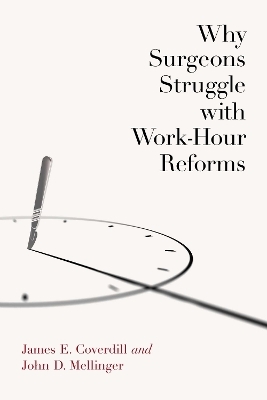
Why Surgeons Struggle with Work-Hour Reforms
Seiten
2021
Vanderbilt University Press (Verlag)
978-0-8265-0105-9 (ISBN)
Vanderbilt University Press (Verlag)
978-0-8265-0105-9 (ISBN)
On July 1, 2003, work-hour reforms were enacted nationally for the roughly 129,000 resident physicians in the United States. Why Surgeons Struggle with Work-Hour Reforms focuses on general surgeons, a historically long-hour specialty, who fiercely opposed the reforms and are among the least compliant.
On July 1, 2003, work-hour reforms were enacted nationally for the roughly 129,000 resident physicians in the United States. The reforms limit weekly work hours (a maximum of eighty per week) and in-hospital call (no more than once every three nights), mandate days free of clinical and educational obligations (one day in seven), and regulate other aspects of resident work life.
Why Surgeons Struggle with Work-Hour Reforms focuses on general surgeons, a historically long-hour specialty, who fiercely opposed the reforms and are among the least compliant. Why do surgeons struggle with the reforms? Why do they continue to work long hours and view the act of doing so as reasonable if not quintessentially professional? Although the analysis is situated in the growing scientific literature on the consequences of fatigue, the authors do not adjudicate between the claims of surgeons and reform advocates about the effects of long work hours on patient or provider safety. Rather, the aim is to explore and explain how aspects of the occupational culture of surgeons and the social organization of surgical training and practice interlock to impede the reforms.
On July 1, 2003, work-hour reforms were enacted nationally for the roughly 129,000 resident physicians in the United States. The reforms limit weekly work hours (a maximum of eighty per week) and in-hospital call (no more than once every three nights), mandate days free of clinical and educational obligations (one day in seven), and regulate other aspects of resident work life.
Why Surgeons Struggle with Work-Hour Reforms focuses on general surgeons, a historically long-hour specialty, who fiercely opposed the reforms and are among the least compliant. Why do surgeons struggle with the reforms? Why do they continue to work long hours and view the act of doing so as reasonable if not quintessentially professional? Although the analysis is situated in the growing scientific literature on the consequences of fatigue, the authors do not adjudicate between the claims of surgeons and reform advocates about the effects of long work hours on patient or provider safety. Rather, the aim is to explore and explain how aspects of the occupational culture of surgeons and the social organization of surgical training and practice interlock to impede the reforms.
James E. Coverdill is Meigs Distinguished Teaching Professor Department Head in Sociology at the University of Georgia. John D. Mellinger is Professor and Chair, Division of General Surgery, and Vice Chair, Department of Surgery at Southern Illinois University.
| Erscheinungsdatum | 15.01.2021 |
|---|---|
| Verlagsort | Tennessee |
| Sprache | englisch |
| Maße | 151 x 229 mm |
| Gewicht | 320 g |
| Themenwelt | Medizin / Pharmazie ► Medizinische Fachgebiete ► Chirurgie |
| Recht / Steuern ► Arbeits- / Sozialrecht ► Arbeitsrecht | |
| Recht / Steuern ► EU / Internationales Recht | |
| Recht / Steuern ► Privatrecht / Bürgerliches Recht ► Medizinrecht | |
| ISBN-10 | 0-8265-0105-2 / 0826501052 |
| ISBN-13 | 978-0-8265-0105-9 / 9780826501059 |
| Zustand | Neuware |
| Haben Sie eine Frage zum Produkt? |
Mehr entdecken
aus dem Bereich
aus dem Bereich
Buch | Softcover (2021)
Urban & Fischer in Elsevier (Verlag)
CHF 75,60


